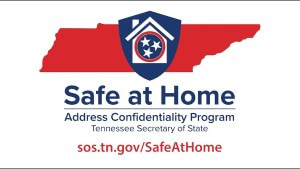Tennessee Safe At Home Address Confidentiality Program
- At February 16, 2020
- By Miles Mason
- In Domestic Violence, News
 0
0

Safe at Home Address Confidentiality Program
New Tool to Keep Victims Safe
For the victim of domestic violence, sexual assault, human trafficking, or related crime, the first step is to escape the violence. The next step is relocating to a safe place free from abuse. These victims live in constant fear their perpetrators will find them at the new address. Stalk them. And begin abusing them again, perhaps worse than before.
The fact that a public records search can link names to residential addresses has only made the problem worse.
Mason Interview on Live at 9 on the new Safe at Home program from the State of Tennessee:
Problem of Public Records Being Public
The Tennessee Public Records Act allows public inspection and copying of government records along with identifying information. Full names, legal addresses, and phone numbers are readily available through simple public records searches. Because these records are accessible to all, government information sources, such as public schools, can be used by perpetrators to locate their victims and continue abusing and intimidating them.
This is the harsh reality the Safe At Home Address Confidentiality Program protects against. The program serves as an information barrier to help victims leave the cycle of violence behind.
Repeat Victims of Abuse
Address confidentiality programs, or ACPs, protect against repeated victimization by concealing where victims reside. Public Chapter 1004, effective March 1, 2019, created the Safe At Home Program which is now up and running. With its passage, Tennessee became the 38th state to offer address confidentiality to abuse victims. The first program was through Washington State (1991). Today, nearby states with ACPs include Mississippi, North Carolina, Kentucky, Virginia, West Virginia, and Missouri. (At the time of this writing, Arkansas has Confidential License Registration only.)
Secretary of State Tre Hargett

Tennessee Secretary of State Tre Hargett
In February 2019, Secretary of State Tre Hargett announced the new program, “Safe At Home provides victims and their families with a tool to help heal from their abuse, begin new lives, and finally feel a sense of security in their communities.”
Shortly thereafter, Secretary Hargett was interviewed on WREG News Channel 3 about the purpose and operation of the program. (YouTube post May 6, 2019.) Tennessee ranked in the top 10 for domestic homicide and, as Hargett pointed out, Shelby County is number one in the state. Asked why victim address confidentiality is necessary, Hargett answered, “[T]here are a lot of public ways that people can get your address.” Take stalking, for example. An aggressor can continue stalking the victim by obtaining address information from public sources. “Last year, out of the over 20,147 cases of domestic violence in Tennessee,” said Hargett, “over 2,000 of those were repeat victims and 18 of those ultimately ended in murder.” The program helps prevent repeated victimization by providing a substitute address while keeping the actual residential address confidential.
On program eligibility, an individual cannot simply make a claim of sexual abuse. Some evidence is required. Hargett mentioned several options, “If you can show there is outstanding litigation or there’s been a conviction of someone for these crimes. Or if you have a notarized statement from a therapist, psychiatrist, social worker, then you can become part of the program.”
Laws are in place, but the nature of domestic violence and sex crimes makes reporting and escaping abuse particularly difficult. Hargett explained how so many victims “think it’s their fault, [that] they’ve done something wrong.” Breaking the cycle of abuse means assuring each victim, “you have a place to go, that you can report those crimes.” When victims do report, Tennesseans have a societal responsibility to protect them.
Establishing program eligibility is easy. Start with sos.tn.gov/safeathome and go to the list of Certified Application Assistants. Other safe options are to call 615-253-3043 or email TNSOS.SAFE@tn.gov. Information is also available through the Family Safety Center, District Attorney’s Office, and women’s advocacy centers.
How the Safe At Home Program Works
The Safe At Home Program shields the victim’s legal address which is typically a residential address. That address information is made confidential. The program participant is assigned a substitute address as an official mailing address for state and local government purposes. Because the confidential address does not appear on public records reflecting public school enrollment or receipt of public benefits, for example, the actual location of the victim and children cannot be determined through a public records search. With very few exceptions (such as property taxes), only the substitute legal address is made public. Watch this introductory YouTube video from the SOS.
Safe At Home participation ensures three levels of protection:
- The program receives all of the participant’s first class and certified mail and securely forwards it to the participant’s designated mailing address (this could be a P.O. Box or street address). The designated address is confidential and need never be disclosed to the sender.
- The program serves as agent of process for the participant, receiving legal papers that must otherwise be delivered or served directly on the participant.
- The program acts on behalf of the participant to verify residency and eligibility for public benefits or public school enrollment for any state or local government agency that requires such verification.
For instance, a participant uses the substitute address when registering to vote, setting up utilities, and applying for TennCare Medicaid, CoverKids, Families First, and SNAP. The substitute address is printed on the participant’s drivers license and motor vehicle records. Asking an employer or bank to use the substitute address is possible, too, as all first class mail gets forwarded through the program. Additionally, participants are exempt from jury selection in state court or municipal court (although response to the jury summons is required).
How to Apply for the Safe At Home Program
Safe At Home is a voluntary program that extends to children in the home. Certified Application Assistants with partnering agencies throughout the state are trained to assist applicants. After completing the Notice of Change Form and being assigned a Participant Number, additional forms are used to reflect changed circumstances including:
- Notice of name change following legal change of name;
- Release of a child’s school records;
- Eligibility verification request used by government officials and public school officials to enroll in public benefits or public school;
- Program withdrawal request, and more.
Being a participant means greater safety and security in one’s own home. If you are relocating to escape a violent situation, then make a secure call, apply for the program, and protect yourself and your children.
To learn more, see:
- Domestic Violence & Tennessee Divorce Law | Get Safe Now
- What You Need to Know about Domestic Abuse to Protect You and Your Family.
- Escape Plan: Tips for Victims Leaving Domestic Violence.
- Family Safety Center of Memphis & Shelby County, TN









